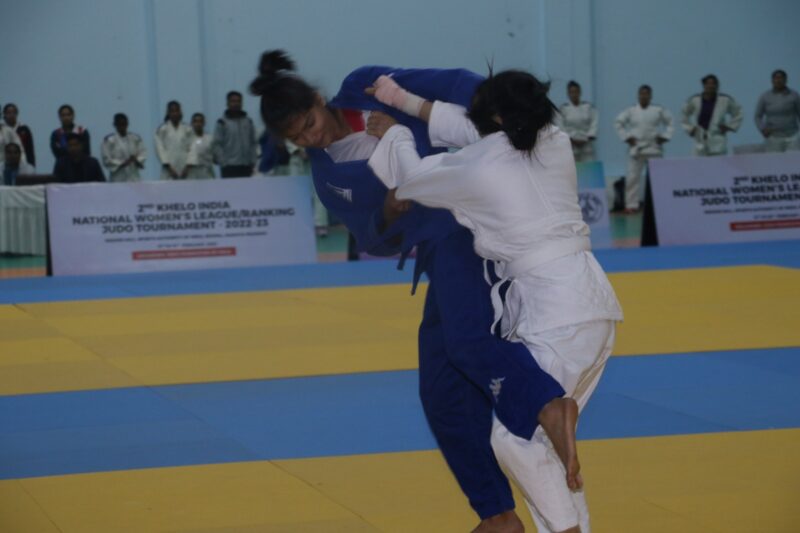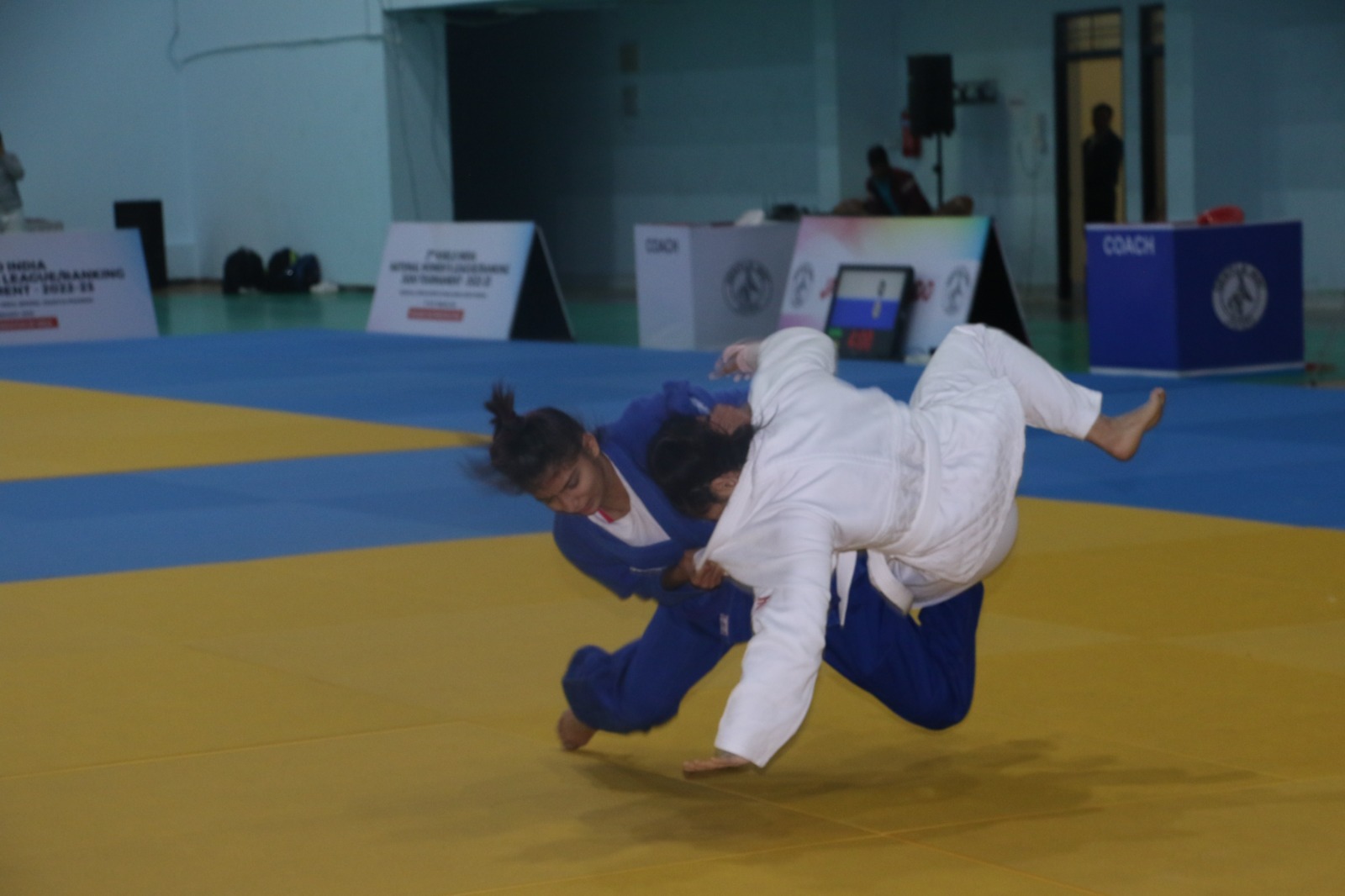About eight years ago, a young girl from urban Munirka in south Delhi quit judo classes after she hurt her eye during practice at the local judo academy run by Samunder Tokas, a former national player.
It took over a month for Himanshi Tokas’s mother Renu to persuade her daughter to join the judo classes again. She did join the practice sessions but on an assurance from her mother that she will not get hurt again.
Renu’s persuasion paid dividends as Himanshi has now become a rising star.
In the first week of April, the 18-year-old Himanshi won the Asian Games selection trials in women’s 63kg.
In a nail-biting women’s 63kg final at the Capital’s Indira Gandhi Indoor Complex, Himanshi outplayed her more fancied rival Unnati Sharma to stamp her authority.
Both Himanshi and Unnati have been shortlisted for the national judo team in preparation for the Hangzhou Asian Games scheduled to be held in September this year, confirmed Jiwan Sharma, a member of the national selection panel for judo.
“The final trials will be held close to the Asian Games. The winner in each weight category will be eligible to represent the country subject to the number of quota places available to the judo team,” Sharma added.
“The selection trials were held in all the seven weight categories in the women’s and seven in the men’s section.”
For Himanshi, winning the 63kg title was a triumph over adversity.
“I’ve reached this far with the support of my mother,” Himanshi said candidly after she won the trials.
Growing up in a conservative and male-dominant family, the teenager faced a barrage of criticism in her formative years for taking up judo.
There was opposition from the elderly and relatives, and “don’t send her for sports activities” was the general refrain in the Tokas family, revealed mother Renu.
“The youngster was always criticised for not winning any medals in her formative years,” recalled Renu of the challenging situation at home.
Some of the family members would often say to Himanshi “You will do nothing in judo; sit at home and study”.
However, love and support from mother motivated Himanshi, the elder of the two siblings in the Tokas family, to learn fundamentals of the combat sport at the local academy.
Himanshi’s mother, a housewife, had to scrimp and save even for her judo dress as father Ravi Tokas, a personal driver of a doctor, was not well off.
The big change
But a silver medal in her weight category at the 2019 sub-junior national championships in Imphal, Manipur, silenced her critics.
The big break-through came the following year when the Delhi teenager finished fifth in her weight category at the 2020 Khelo India Youth Games in Guwahati, Assam.
Himanshi’s performance attracted attention of experts in the field and she was shortlisted for the Sports Authority of India (SAI) National Centre of Excellence (NCOE) scheme in Bhopal. She joined the SAI scheme at the end of the 2020 season.
“She (Himanshi) was selected under the SAI talent identification scheme,” said Yashpal Solanki, SAI’s high performance director in judo.
Under the NCOE scheme, athletes are given boarding/lodging facilities besides domestic and international exposure.
Himanshi’s father and other male members of the family were against sending the 16-year-old to Bhopal to pursue judo.
However, it was Himanshi’s mother who played a pivotal role in fulfilling her daughter’s dream of pursuing judo in a more organised and structured environment at SAI Sports Complex in Bhopal.
“It was a kind of tug-of-war in the family. I was on Himanshi’s side as she was determined to go, while the rest of the family was on the other side. There must have been tremendous pressure on our daughter,” recalled Himanshi’s mother.
“It was extremely tough to stand all alone while the rest of the family members were opposed to sending Himanshi to Bhopal. But for the happiness of my daughter, I even went to the extent of telling a lie to all. I told everyone in the family that Himanshi is going for advanced practice only for a month to Bhopal.”

Travels softened family
With Himanshi travelling to other Asian countries and Europe for advanced practice, critics in the family softened their stance of “not giving equal opportunities to girl child”.
“Thank God! Himanshi started excelling on the sports field. Everyone in the family is happy now,” says Renu.
Circumstances, inadvertently, have toughened the teenager from Munirka, who has been practicing judo for eight long years now.
This was evident from the Asian Games selection trials’ final bout against Unnati.
She made a nervous start to the bout. Before the final, Himanshi complained of shivering to Yashpal Solanki (SAI coach). The coach’s immediate response was to direct her “to go out in the sun” and stand for five to 10 minutes to feel better.
Whether standing in the mid-day sun helped her get rid of the nervousness is debatable, it must have certainly warmed up the teenager.
“Sending her out in the sun was sort of tricking the mind before a crucial bout. It was meant to calm the nervous system,” said Solanki, who is high performance director in judo in Bhopal said.
63kg in the judo team,” Himanshi added.
Last year too, during the 2022 Birmingham Commonwealth Games selection trials, Himanshi won the 63kg bout. Since the Birmingham Commonwealth Games Organising Committee had allotted the Indian judo team a limited quota, the 63kg weight was scrapped.
It was heartbreaking for the teenage judoka.
“I don’t know why the below 63kg weight was scrapped from the Commonwealth Games in Birmingham,” Himanshi said.
Himanshi’s mother got agitated when asked about the 2022 Commonwealth Games miss. She said that the sports administrators of the country make policies seated in their office, while not feeling the pain of athletes and the hard work needed to reach the international level.
“Unless an athlete is given a chance, how can someone predict that the athlete can’t win a medal,” Renu said before adding that it took her a lot of time to console her daughter.
“The selection panel should announce [in advance] which weight categories will be eligible for the international meets so that athletes have a clear idea what to do and what not to do,” said Himanshi’s mother.
“With support from coach and friends, Himanshi was able to regain confidence.”
Himanshi was also a member of the SAI team that went to Spain for a 15-day exposure tour twice last year.
“She (Himanshi) also finished fifth in her weight category at the 2022 Cadet Asian Championships in Thailand,” Solanki added.
The Spanish exposure tours were eye-opening, recalls Himanshi.
“The judo players in Europe practice differently than the young Indian players. European players continuously vary their technique during a match to score a point, while Indian players stick to one technique and aren’t able to change their tactics during a match,” Himanshi observed.
According to Himanshi, emphasis should be at grassroots coaching in India.
“We should aim at having a good coaching system for state-level players,” said the teenage judo player.
Perhaps lack of good coaching set-up is a reason why India has failed continuously in international tournaments.
Since Poonam Chopra’s bronze (light-weight, below 57kg) at the 1994 Asian Games in Japan, Indian judokas have failed to score a podium finish at the continental games.
Manipur’s Sushila Devi competed at the 2020 Tokyo Olympic Games held in Japan in 2021, but she qualified through continental quota place.
India’s Olympian and Arjuna Awardee in judo, Cawas Billimoria, is hopeful that in coming years there will be a change.
“It will certainly take time for the Indian judokas to excel at the Asian Games as world’s top judo playing nations, including Japan and Korea, compete at the continental games,” Billimoria explained.
Billimoria, a former Asian Games bronze medalist in heavyweight category, told Patriot from Mumbai, “Things are improving in judo at least in terms of financial support as there are SAI schemes and corporate-run projects also. Several promising judo players are getting international exposure these days. It will certainly build a good foundation.”





